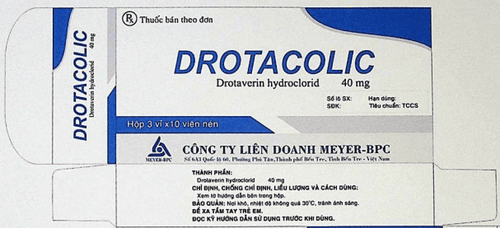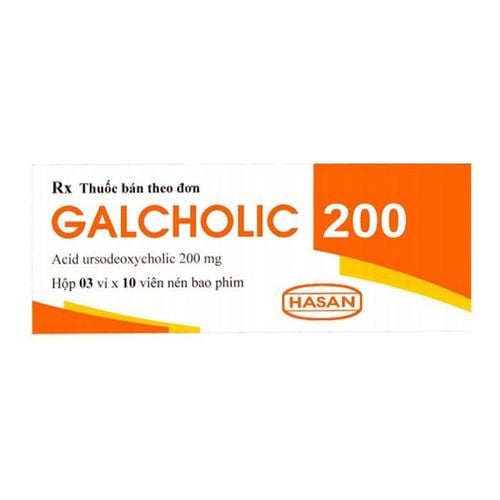This is an automatically translated article.
Megistan is a drug acting on the gastrointestinal tract, often indicated in the treatment of hepatobiliary diseases, gallstones,... To use the drug effectively, patients need to learn some information about its uses, Dosage and notes when using Megistan in the article below.
1. What is Megastan?
Megistan has the main ingredient is Ursodeoxycholic Acid salt - works to prevent gallstone formation, treat abnormalities of liver dysfunction,...
Megistan works to prevent gallstone formation through exercise mechanism. Neutralizes ursodeoxycholic acid in bile, inhibits intestinal cholesterol absorption, reduces cholesterol saturation in bile ducts. Reduced cholesterol saturation leads to a gradual dissolution of cholesterol in gallstones.
In cholestatic liver disease, ursodeoxycholic acid increases the circulation in the bile duct, reduces the erosion of bile salts, thereby reducing the toxicity to cells. Megistan also protects liver cells from harmful effects of bile acids such as deoxycholate, iithocholate, chenodeoxycholic.
Megistan drug is absorbed mainly in the small intestine after oral administration, metabolized in the liver, strongly bound to plasma proteins, and finally eliminated largely in the faeces.
2. Indications of the drug Megastan
Megistan is indicated in the following pathological cases:
Unenhanced cholesterol stones in the gallbladder less than 15mm in diameter. The patient has gallstones but surgery is contraindicated. Primary cirrhosis. Inflammation of the biliary tract. Chronic hepatobiliary diseases due to viscous mucus disease.
3. Contraindications of the drug Megastan
Megistan medicine is not indicated for use in the following medical conditions:
Allergy to ursodeoxycholic acid or any other ingredients of the drug. Pregnant women are not contraindicated to use Megistan due to the risk of toxicity to the fetus. The patient is allergic to bile acids. Patients with gallstones have complications, biliary colic, pancreatitis, peptic ulcer, biliary obstruction, bile duct inflammation, cholecystitis. Patients with gallstones are calcium stones. Pathology of decreased contractility of the gallbladder, inactive or underactive gallbladder. Gallbladder not working. Intra- or extrahepatic cholestasis. Acute liver disease or exacerbation of chronic liver disease. Notes when taking Megistan:
Check liver function (SGOT, SGPT, GGT, bilirubin) before and while taking the drug. Patients with elevated liver enzymes need to be careful when taking the drug, if necessary, the drug can be stopped. Preclinical imaging studies are needed before and during drug therapy for patients with cholesterol gallstones to determine the course of treatment and evaluate the effectiveness of the drug. If the gallbladder is not visible on X-ray, calcified stones, impaired contractility of the gallbladder, and frequent biliary colic occurs, Megistan should not be used. Patients with diarrhea should reduce the therapeutic dose of Megistan, severe diarrhea may stop treatment. Patients with cirrhosis due to primary cholestasis, impaired liver function need to monitor the concentration of bile acids in the blood plasma during the use of the drug. Consider increasing the dose of Megistan and the use of other therapeutic agents in the case of cholestasis causing pruritus. Use of the drug must be combined with a diet, reducing calories and cholesterol. Drugs that cross the placenta and breast milk should consider the benefits before use in pregnant and lactating women.
4. Drug Interactions of Megistan
Some drug interactions of Megistan may be encountered:
Concurrent use of Megistan with antacids (Cholestyramine, aluminum), lipid-lowering drugs, estrogen, Progestin, Clofibrate, Colestipol, reduces absorption and effects of drugs. Activated charcoal reduces the absorption of the drug Megistan when taken together. Megistan increases the absorption and effects of Cyclosporin drugs. Ciprofloxacin is less effective when co-administered with Megistan.
5. Dosage and usage
How to take the drug Megistan:
Megistan is in the form of a soft capsule. Drink directly with a sufficient amount of water during meals. Drink 1 time and evening or divided into 2 times morning and evening. Dosage in the treatment of cholesterol gallstones:
Usual dose: 5-10mg/kg/day; average: 7.5 =mg/kg/day. For obese patients: 10mg/kg/day. The minimum treatment time is 6 months, if the stone size is larger than 1cm, it can be extended to 12 months. Dosage in the treatment of chronic hepatobiliary disease:
Usual dose: 13-15mg/kg/day. Initial dose: 200mg/day, then gradually increase to a therapeutic dose of about 4-8 weeks. Acquired hepatobiliary disease due to viscous mucus disease, treatment dose: 20mg/kg/day.
6. Side effects of the drug Megastan
Some unwanted effects may occur when taking Megistan medicine
Allergic reactions, itching, urticaria. Diarrhea, pasty stools, irritation of gastrointestinal mucosa, vomiting, nausea. Gallbladder inflammation, gastric ulcer. Urinary tract infections . Right lower abdomen pain. In summary, Megistan is a drug that works to treat primary hepatobiliary diseases, gallstones or reduce cholesterol stone formation in the bile. Megistan may cause some unwanted effects on the body, so it should be used under the direction of a doctor.













